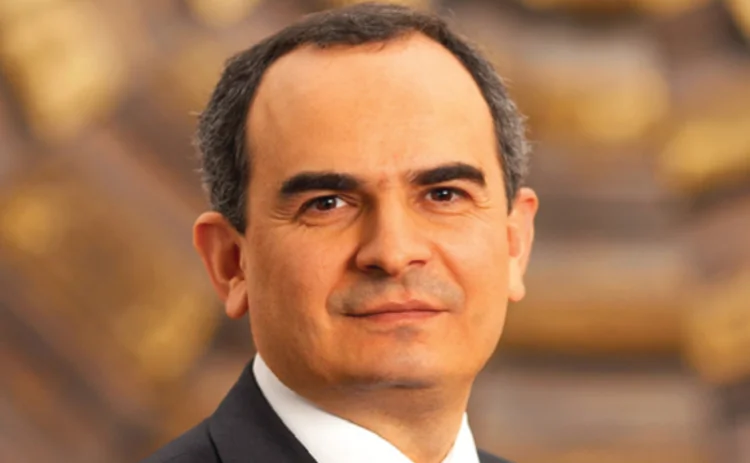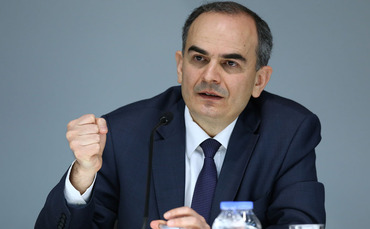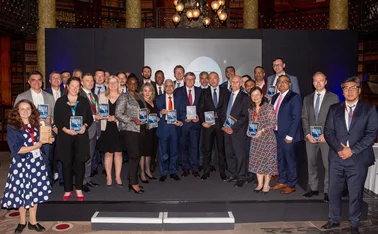
Governor of the Year: Erdem Başçı
Erdem Başçı has guided the Central Bank of the Republic of Turkey through a turbulent period

The true test of character of a central bank governor is often said to be his or her reaction when the going gets tough. The past year has proven a good testing ground for this theory. Most governors have had to address falling commodity prices – either directly as producers or indirectly due to their impact on prices. They have also had to navigate increasingly divergent monetary policies.
Emerging market nations have had a particularly torrid time, with the Brazilian and Russian economies suffering recessions and others struggling to maintain past rates of growth. But few have had to fulfil their role in the face of a gathering currency crisis with their head of state claiming the central bank's policies represent flawed economics and that maintaining high interest rates is tantamount to being a traitor.
This is exactly the position Erdem Başçı, governor of the Central Bank of the Republic of Turkey (CBRT), found himself in the lead-up to the first of what turned out to be two Turkish elections in 2015 – an election process that was described by one central bank insider as "very destructive". Başçı, a former professor of economics at Bilkent University (one of Turkey's top universities) where he earned his PhD after securing a second masters in economics at Johns Hopkins University, has earned a reputation for safeguarding financial stability as well as price stability in Turkey, which has come under pressure in the past year in particular due to food price inflation, largely the result of a poor harvest.
Başçı is also a proponent for maintaining fiscal discipline and effecting structural reforms to support macroeconomic stability that ultimately will permanently boost Turkey's growth performance. But Turkey's increasingly strident and combative president Recep Tayyip Erdoğan, who admittedly has played an important role over the years to restore Turkey's economic credentials, turned on the mild-mannered Başçı appearing to tell him the best way to tackle inflation in Turkey was to lower interest rates and berating his failure to reduce interest rates further in 2015.
While Erdoğan's ultimate goal of low real interest rates may be laudable, his brand of economics regarding the positively correlated relationship between inflation and interest rates appears contrary to mainstream theory and it is unclear if he is of a neo-Fisherist view. For example, in its International Monetary Fund staff report published in December 2014, the Fund suggested the Turkish central bank needed to raise interest rates to combat inflation as its "complex" monetary policy framework had weakened the monetary transmission channel and generated a "credibility gap" for the CBRT. The central bank's independence is enshrined in Turkish law and upholding that independence is viewed as an important component in Turkey's long-stalled efforts to join the European Union.

IMF staff have the luxury of proffering their advice without having to implement such policies on the ground. This provides them with an impartial view but also one that is desensitised to local conditions. This is particularly the case in Turkey, where politicians have stated that the implementation of high interest rates is "un-Islamic" as charging interest, or riba, is forbidden under Islamic law. While Turkey has a secular constitution, the vast majority of its 75 million citizens are Muslim. Moreover, looking through the prism of Turkey's economic past of super inflation (inflation exceeded 130% in the 1990s) and currency crises, current single-digit inflation rates, while well above the CBRT's 2015 target of 5%, look relatively benign.
In addition, Turkey's economy continued to grow in 2015, with GDP rising by around 3% last year despite a flood of migrants entering the country due to the ongoing crisis in neighbouring Syria, lower oil prices, a slowdown in China and other geopolitical risks. Turkey has not wasted its relatively limited pool of foreign exchange reserves of around $100 billion, which some analysts consider as too low to mount a prolonged defence of the lira. And this is in large part due to the work of Başçi. "It is amazing how Erdem Başçı has managed to guide the central bank through these years," says Commerzbank's head of emerging market research Simon Quijano-Evans.
Shaped by crisis
Indeed, the CBRT's monetary policy framework is a system shaped by crisis. The 1990s and early 2000s were marked by spiking inflation and turmoil in financial markets, finally prompting the government in 2001 to stop funding itself using central bank loans and instead establish the CBRT's operational independence and inflation targeting regime. Başçı presided over the latest chapter in the system's development at the start of his term as governor in 2011, as the advanced-economy response to the 2008 global crisis sent capital rushing into emerging markets.
The CBRT's policy framework is multifaceted and has been criticised by both the IMF and private sector economists for its complexity. But it is designed to address multiple objectives at once: resisting volatile capital flows, stabilising the banking sector and keeping inflation in check.
Interest rates are bounded by a corridor, with the floor formed by the central bank's overnight borrowing rate and the ceiling by the overnight lending rate. The CBRT's policy rate is the one-week repo rate, but unlike most central banks, which use their liquidity policy to pin market rates at the policy rate, the CBRT often causes the market to deviate by restricting or supplying liquidity. By reducing the flow of liquidity, the central bank pushes market rates up towards the ceiling of the corridor, closer to the overnight rate.
Consequently, the average funding rate, which weights the overnight and one-week market rates, is arguably a better guide to policy than the one-week rate that has stood at 7.5% since February 2015. It is this average rate that Başçi appears often to have used as a policy tool, tightening monetary policy in practice even when the policy rate is ostensibly at a standstill (see chart).
The central bank took this approach in response to bouts of inflation in 2012, 2013 and to a lesser extent in 2015. In this respect, although inflation has overshot the central bank's approximate 5% inflation target for the majority of Başçı's term, the CBRT has not been as passive as it may appear to a casual observer. Indeed, some note use of the average rate has been a handy method of fending off pressure from the government not to raise interest rates, as many politicians may not be familiar with the finer points of central bank liquidity management.
Asymmetric intentions
The interest rate corridor is asymmetric around the policy rate and also varies in size over time, another unusual but deliberate policy choice. The aim is to allow the central bank to move short-term rates around briefly and suddenly, discouraging short-term capital flows but allowing longer-term investments to enter undisturbed. Başçı wrote in the central bank's 2011 annual report that such measures had left Turkey's exchange rate more stable than many other emerging markets. "The CBRT has been quite creative because FX reserves are not enough to cover external debt and the current account deficit on a one-year basis," says Quijano-Evans.
The policy is now set for further change. Under a 'roadmap' unveiled in 2015, the CBRT plans to "normalise" its framework, as advanced economies, notably the Federal Reserve, return their interest rates to a more normal footing. A key part of the plans is to make the corridor narrower and more symmetric around the policy rate. This in turn should offer markets a greater degree of certainty, and may help to reverse capital outflows that have sent the lira tumbling in recent years.
At its meeting in December, the CBRT's monetary policy committee strongly hinted such a move would come at the next meeting, scheduled for January 19. In the minutes of the meeting, it emphasised exchange rate volatility had fallen since the global policy normalisation process began. "Against this background, monetary policy simplification steps would begin with the next meeting, should the decline in volatility prove persistent," it said.
Financial reform
Başçı himself has a reputation as a consummate professional who is highly knowledgeable and yet is an able listener. "He has a positive approach to the events that facilitates solutions to complicated problems, even in critical circumstances," says Burhan Goklemez, who was a deputy governor at the same time as Başçı. "Even though he holds vast amounts of background knowledge, he always carefully listened to and evaluated his colleagues' opinions."
His ability to listen to people combined with his excellent central banking and markets knowledge has also earned him respect internationally. "He spent a lot of time in the past year talking to investors and assuaging their concerns and is very open to dialogue; I don't know anyone who would have been willing to take his place," Quijano-Evans says. Perhaps as a part of this effort, bond spreads for Turkey's foreign debt have remained at relatively tight levels given the political machinations on the domestic front.
Goklemez says the central bank is also very capable in its analysis of the world economy. "Although global and geopolitical risks are awaiting them, I have no doubt that they will succeed in dealing with these issues," he says.
G20 and corporate funding
Başçı's international standing was important as Turkey assumed the presidency of the G20 in 2015, the year that core elements of the international financial reform agenda were completed. Notably, a common international standard on total loss-absorbing capacity for global systemically important banks was agreed and the G20 initiated work to address corporate leverage. Part of this initiative, undertaken by the Financial Stability Board (FSB) and other international organisations, looks at the incentives that distort the balance of debt and equity in corporate funding structures, focusing on the implications for financial stability.
Small and medium-sized enterprise financing and the role of capital markets in facilitating SME funding were discussed in the FSB regional consultative group for Middle East and North Africa meetings, co-chaired by Başçı in 2015. This was in line with the G20 Turkish presidency's priorities for 2015 to investigate structural issues influencing the capital structure of corporates and to look at possible policy measures for incentivising equity-based financing policy issues. At the request of the Turkish G20 presidency, a report was prepared on corporate funding structures, and the work on this effort will continue into 2016.
As 2015 drew to a close there were signs of a rapprochement with the government. Mehmet Şimşek, the new deputy prime minister, struck a conciliatory note after elections in November returned the AKP party to power. Şimşek has defended the independence of the central bank and the importance of anchoring price expectation. However, few believe the pressure on Başçı has eased post-elections.
Inflation hit 8.1% in November, well above the 5% target, despite falling oil prices (Brent crude oil now trades at around $30 a barrel versus more than $110 in mid-2014). With price pressures likely from food, housing and the service sectors, efforts by the Turkish government to raise the country's minimum wage and possible further interest rate hikes by the Federal Reserve, the CBRT looks set to continue to face a tough job to rein in inflation with some government officials resisting any attempt to raise rates.
Nonetheless – in part due to Başçı's stewardship of financial and price stability – Turkish GDP growth is projected to increase from 3% in 2015 to above 4% in 2017, according to a November 2015 report by the Organization for Economic Co-operation and Development, "as political uncertainties are assumed to fade, employment continues to rise, and the exchange rate depreciation and the gradual strengthening of global markets support export growth".
The Central Banking awards were written by Christopher Jeffery, Tristan Carlyle, Daniel Hinge, Arvid Ahlund, Dan Hardie and Rachael King.
Only users who have a paid subscription or are part of a corporate subscription are able to print or copy content.
To access these options, along with all other subscription benefits, please contact info@centralbanking.com or view our subscription options here: http://subscriptions.centralbanking.com/subscribe
You are currently unable to print this content. Please contact info@centralbanking.com to find out more.
You are currently unable to copy this content. Please contact info@centralbanking.com to find out more.
Copyright Infopro Digital Limited. All rights reserved.
You may share this content using our article tools. Printing this content is for the sole use of the Authorised User (named subscriber), as outlined in our terms and conditions - https://www.infopro-insight.com/terms-conditions/insight-subscriptions/
If you would like to purchase additional rights please email info@centralbanking.com
Copyright Infopro Digital Limited. All rights reserved.
You may share this content using our article tools. Copying this content is for the sole use of the Authorised User (named subscriber), as outlined in our terms and conditions - https://www.infopro-insight.com/terms-conditions/insight-subscriptions/
If you would like to purchase additional rights please email info@centralbanking.com







